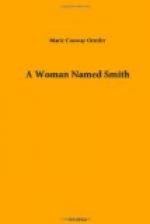“After the death of James Hampden Hynds, it was discovered that he had added a singular enough codicil to his will. This codicil provided that in the event the jewels were found intact, and Richard Hynds’s innocence thereby incontrovertibly established, Hynds House as it stood should revert to him as eldest son, after the custom of the family. But until the jewels were recovered, Richard and his heirs were to have exactly—nothing. And nothing is what Richard and his heirs got.”
“And was he really guilty?” breathed Alicia. Her sympathy was instantly with Richard. That is exactly like Alicia, who is sorry for the fatted calf, and the Egyptians drowned in the Red Sea, and Esau swindled out of his birthright; had she been one of the wise virgins she would have trimmed the lamps of all the foolish ones and waked them up in time.
“In theory,” said the judge, “a man is innocent until he is proved guilty. In practice, he is guilty until he can prove his innocence.”
“And was nothing, absolutely nothing, ever heard or known further?—nothing that would justify his mother’s faith, or comfort his poor young wife’s heart?”
“There was but one incident to which even the most credulous could attach the slightest importance. You shall judge for yourself whether it deserved any. Freeman Hynds, riding about the plantation after his habit, was thrown from his horse and died from the injuries sustained. He recovered consciousness for a few minutes before he died; some said he never really regained it. Be that as it may, the dying man cried out, in a voice of great anguish and affliction: ‘Richard! Brother Richard! The jewels—the jewels!’ He struggled to say more, and failed; looked into the concerned faces around him, with the awful look of the soul about to depart; struggled to raise himself; and fell back upon his pillow a corpse.
“Some—they were in the majority—said, sensibly enough, that the pain and disgrace of his brother’s downfall had haunted the poor gentleman’s death-bed, and occasioned that last sad cry. Some few said he had wished to confess a thing heavy upon his conscience, who had taken his brother’s place as Jacob took Esau’s. Richard’s wife, of course, was of these latter. She went to her grave a passionate believer in the innocence of her husband, whom she averred to have been a deeply wronged and cruelly used man; and, for heaven’s sake, who do you suppose she claimed had wronged him? Freeman! She couldn’t prove anything; she hadn’t the ghost of a clue to hang the ghost of an accusation upon; yet, womanlike, she clung to her notion, and she taught it to her son as one teaches a holy creed.
“The Hyndses were excellent haters. Freeman’s daughter, born into an atmosphere of family disruption, abhorred the very memory of her uncle, and hated her uncle’s wife, the woman who doubted and led others to doubt her father’s honesty. This hatred she discovered for Richard’s son, who, as he grew older, referred to Freeman as ’my Uncle Judas.’




